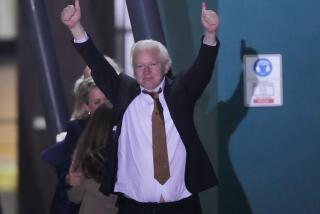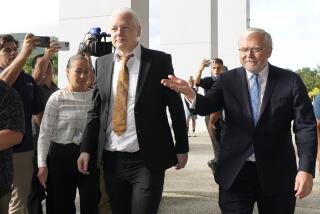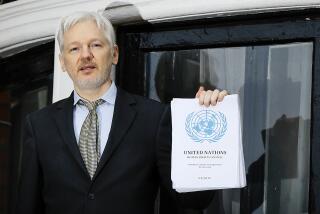WikiLeaks’ Julian Assange to take fight to British Supreme Court
- Share via
Reporting from London — Julian Assange, founder of the WikiLeaks website, is free to ask Britain’s highest court to decide whether he should be extradited to Sweden on allegations of sexual assault, judges ruled Monday.
The 40-year-old Australian has been battling extradition to Stockholm, the Swedish capital, since a judge ruled in February that he should be sent there to face accusations of raping and molesting two women.
Assange and his lawyers have 14 days to file a request for review by the Supreme Court. If it refuses to hear the matter, Assange would be extradited within days of the decision. If it accepts, the case would probably come before the court sometime next spring, the BBC reported.
Assange denies any misconduct and insists his relations with the women in separate encounters in August 2010 were consensual. He contends that the allegations against him are politically motivated, a pretext to ship him onward for prosecution in the U.S., where the Obama administration has roundly condemned him for leaking thousands of diplomatic documents on his website.
He surrendered to police in London last December after Sweden issued a warrant for his arrest. He has spent almost the entire time since then under “mansion arrest,” living on a supporter’s sprawling country estate outside London but forced to wear an electronic tag, abide by a curfew and check in with police daily.
Last month, judges on Britain’s High Court upheld the earlier ruling approving Assange’s extradition. On Monday, they said he would not be allowed to pursue his case any further through the normal appeals process but could apply directly to the Supreme Court for a hearing, on the basis that general principles worthy of the court’s scrutiny were at stake.
Those principles deal with which bodies in foreign countries ought to be allowed to request extradition of suspects from Britain.
“Today the High Court has decided that an issue that arises from my own case is of general public importance and may be of assistance to other cases and could be heard by the Supreme Court,” Assange told reporters. “I think that is a correct decision and I am thankful. The long struggle for justice for me and others continues.”
More to Read
Sign up for Essential California
The most important California stories and recommendations in your inbox every morning.
You may occasionally receive promotional content from the Los Angeles Times.














